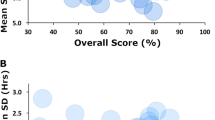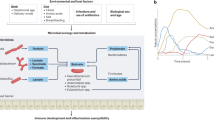Abstract
The gut microbiota harvests energy from indigestible plant polysaccharides, forming short-chain fatty acids (SCFAs) that are absorbed from the bowel. SCFAs provide energy—presumably after easily digested food components have been absorbed from the small intestine. Infant night waking is believed by many parents to be due to hunger. Our objective was to determine whether faecal SCFAs are associated with longer uninterrupted sleep in infants. Infants (n = 57) provided faecal samples for determining SCFAs (7 months of age), and questionnaire data for determining infant sleep (7 and 8 months). Linear regression determined associations between SCFAs—faecal acetate, propionate and butyrate—and sleep. For each 1% higher propionate at 7 months of age, the longest night sleep was 6 (95% CI: 1, 10) minutes longer at both 7 and 8 months. A higher proportion of total faecal SCFA as propionate was associated with longer uninterrupted infant sleep.
This is a preview of subscription content, access via your institution
Access options
Subscribe to this journal
Receive 12 print issues and online access
$259.00 per year
only $21.58 per issue
Buy this article
- Purchase on Springer Link
- Instant access to full article PDF
Prices may be subject to local taxes which are calculated during checkout
Similar content being viewed by others
References
Martin J, Hiscock H, Hardy P, Davey B, Wake M. Adverse associations of infant and child sleep problems and parent health: an Australian population study. Pediatrics. 2007;119:947–55.
Bernier A, Carlson S, Bordeleau S, Carrier J. Relations between physiological and cognitive regulatory systems: infant sleep regulation and subsequent executive functioning. Child Dev. 2010;81:1739–52.
Crocetti M, Dudas R, Krugman S. Parental beliefs and practices regarding early introduction of solid foods to their children. Clin Pediatrics. 2004;43:541–7.
Morrison D, Preston T. Formation of short chain fatty acids by the gut microbiota and their impact on human metabolism. Gut Microbes. 2016;7:189–200.
Daniels L, Heath A, Williams S, Cameron S, Fleming E, Taylor B, et al. Baby-led introduction to solids (BLISS) study: a randomised controlled trial of a baby-led approach to complementary feeding. BMC Pediatrics. 2015;15:179.
Taylor R, Williams S, Fangupo L, Wheeler B, Taylor B, Daniels L, et al. Effect of a baby-led approach to complementary feeding on infant growth and overweight: a randomized clinical trial. JAMA Pediatrics. 2017;171:838–46.
Jensen M, Cox R, Jensen B. Microbial production of skatole in the hind gut of pigs given different diets and its relation to skatole deposition in backfat. Anim Sci. 1995;61:293–304.
Sadeh A. A brief screening questionnaire for infant sleep problems: validation and findings for an internet sample. Pediatrics. 2004;113:e570–e7.
Leong C, Haszard J, Lawley B, Otal A, Taylor R, Szymlek-Gay E, et al. Mediation analysis as a means of identifying dietary components that affect the fecal microbiota of infants weaned by modified baby-led, compared to traditional, approaches. Appl Environ Microbiol. 2018;84:e00914–18.
Canfora E, van der Beek C, Jocken J, Goossens G, Holst J, Damink S, et al. Colonic infusions of short-chain fatty acid mixtures promote energy metabolism in overweight/obese men: a randomized crossover trial. Sci Rep. 2017;7:2360.
Acknowledgements
The authors would like to acknowledge all the families who participated in the BLISS study, as well as the research staff involved from the Departments of Human Nutrition, Medicine, and Microbiology and Immunology at the University of Otago.
Funding
This study was supported by Lottery Health Research, Meat & Livestock Australia, Karitane Products Society, Perpetual Trustees, High Value Nutrition Science Challenge, New Zealand Federation of Women’s Institutes and the University of Otago, with in kind contributions from Heinz Watties, Ltd; and by a fellowship from Karitane Products Society (RWT).
Author information
Authors and Affiliations
Corresponding author
Ethics declarations
Conflict of interest
The authors declare that they have no conflict of interest.
Additional information
Publisher’s note Springer Nature remains neutral with regard to jurisdictional claims in published maps and institutional affiliations.
Rights and permissions
About this article
Cite this article
Heath, AL.M., Haszard, J.J., Galland, B.C. et al. Association between the faecal short-chain fatty acid propionate and infant sleep. Eur J Clin Nutr 74, 1362–1365 (2020). https://doi.org/10.1038/s41430-019-0556-0
Received:
Revised:
Accepted:
Published:
Issue Date:
DOI: https://doi.org/10.1038/s41430-019-0556-0
This article is cited by
-
The gut microbiome in Alzheimer’s disease: what we know and what remains to be explored
Molecular Neurodegeneration (2023)
-
Antibiotic exposure associated with nighttime sleep duration and daytime sleepiness in newlyweds
Environmental Science and Pollution Research (2023)
-
Increased physical activity improves gut microbiota composition and reduces short-chain fatty acid concentrations in older adults with insomnia
Scientific Reports (2022)
-
Associations between fecal short-chain fatty acids and sleep continuity in older adults with insomnia symptoms
Scientific Reports (2021)



